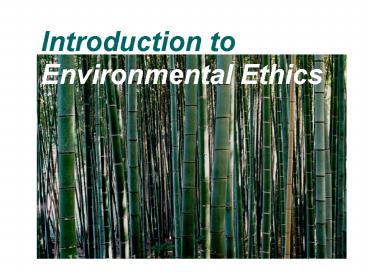Introduction to Environmental Ethics - PowerPoint PPT Presentation
1 / 18
Title:
Introduction to Environmental Ethics
Description:
Science as the answer. Issues ... Concerns about Science. Mechanistic Explanation. Purely mechanistic explanations distort understanding of natural phenomena ... – PowerPoint PPT presentation
Number of Views:89
Avg rating:3.0/5.0
Title: Introduction to Environmental Ethics
1
Introduction to Environmental Ethics
2
Technological solutions to environmental problems
- Silent Spring DDT
- Invented by Paul Müller in 1939
- Introduced during the 1940s
- Responsible for eradicating malaria from Europe
and North America - Used as an agricultural insecticide after 1945
- How DDT kills
- Opens sodium channels in insect neurons
- Neuron fires spontaneously
- Leads to uncontrolled spasming and death
3
DDT
Short-Term Benefits Elimination of undesirable
pests Cut crop loss Hold prices down for
consumers
- Long-Term Effects
- Little effectiveness
- Health hazard
- Biological
- Amplification
4
Ethics, Science, and Environmental Problems
- Environmental Problems
- We live in a period of unprecedented
environmental challenges. - How do we start making the right decisions when
decisions made by our ancestors have had
devastating consequences? - Science as the answer
- Issues are often highly technical
- The promise of objective and factual answers
5
Concerns about Sciencethe Myth of Objectivity
- Beliefs are mere opinion, subjective, while
science provides a true objective account of the
world - Science is neither purely objective nor
value-neutral
6
Concerns about ScienceAnalytic Reductionism
- Nature of complex things explained by (reduced
to) simpler or more fundamental things. - objects, phenomena, explanations, theories,
meanings - Examples
- WaterH2O
- Heatvibration of molecules
- Religionpsychological phenomenon (Freud)
- Lifegenetic mechanisms (Dawkins)
- Criticism
- reductionist approach is inappropriate in other
fields distorts subject matter. - Things have properties as a whole that are not
explainable from the sum of their parts
7
Concerns about Science Mechanistic Explanation
- Purely mechanistic explanations distort
understanding of natural phenomena ecological
relationships
8
Concerns About ScienceSciences Limit in Asking
Questions
- Answers depend on questions
- Is our energy problem a supply problem or a
demand problem? - Two sets of facts lead to different policy
recommendations. Scientific facts alone tell us
nothing about which alternative to choose. - Where do scientific questions come from?
- Formed by people who pay for scientific research
9
Ethics, Science, Environmental ProblemsRedux
- Science cant be the answer
- Environmental challenges not problems of science
technology - Environmental issues raise fundamental ethical
questions - Ethics cant be the answer
- Abstract ethical theory alone cant resolve
concrete problems - Ethics and science
- working together to resolve environmental
challenges.
10
Basics
11
Key Questions
- What should we understand as environment?
- What should we understand as nature?
- How should we as think of our relationship to the
rest of nature? - What kinds of things, besides normal adult human
beings, might we have moral duties towards? - What kind of value should we attribute to these
things?
12
Environmental Ethics
- A systematic account of the moral relations
between humans and their nonhuman natural
environment - An adequate theory must explain
- moral norms that govern our behavior towards the
natural world - to whom or what humans have a responsibility
towards - The basis of these responsibilities
13
Anthropocentric EthicsLight Green
Environmentalism
- Definition
- Only humans have moral value
- Characteristics
- Environmental problems pose a danger to humans
- We should act in ways that will help avert the
threatened harm - Nonhuman things have value only insofar as they
are useful to us or because we care about them - Non-human things are protected by actions
designed to secure human well-being - Sub-problem
- Responsibilities to Future Generations
14
Nonanthropocentric EthicsMid-Green
Environmentalism
- Some natural objects themselves have moral
standing - Sub-problems
- Ethical treatment of animals
- Mass extinction
15
Holistic EthicsDeep Green Environmentalism
- Definition
- our moral responsibilities lie with collections
ofor relationships betweenindividuals, not the
individuals themselves. - Focus is shifted to
- Species
- Populations
- Ecosystems
- Characteristics
- Problems pose danger to anything within this
unrestricted field - Humans have duties far beyond those recognized by
traditional moralities - Living things and natural systems have moral value
16
Social Ethics
17
Thought ExperimentThe Last Man
18
(No Transcript)












![⚡Read✔[PDF] Postcolonial Theory: A Critical Introduction: Second Edition PowerPoint PPT Presentation](https://s3.amazonaws.com/images.powershow.com/10047411.th0.jpg?_=20240604111)


















